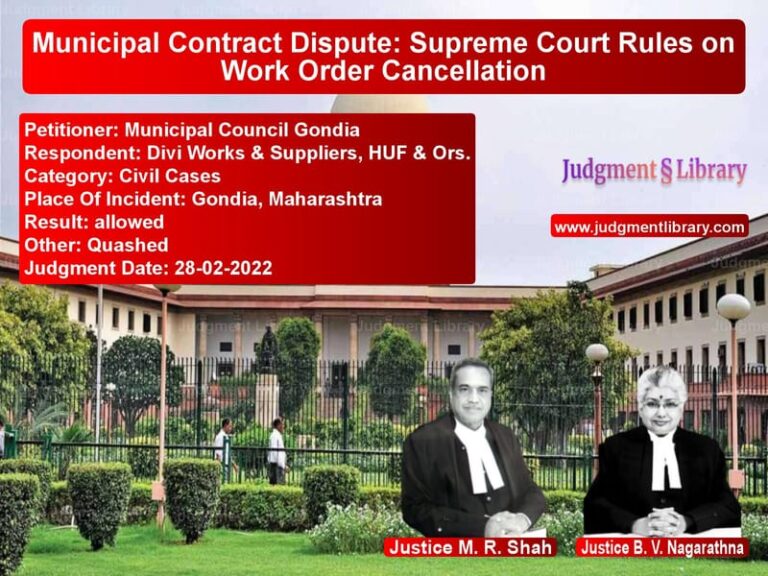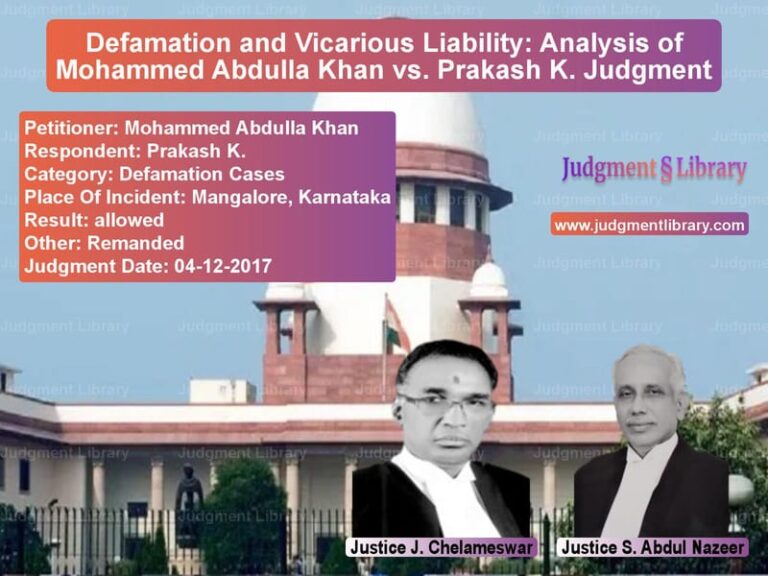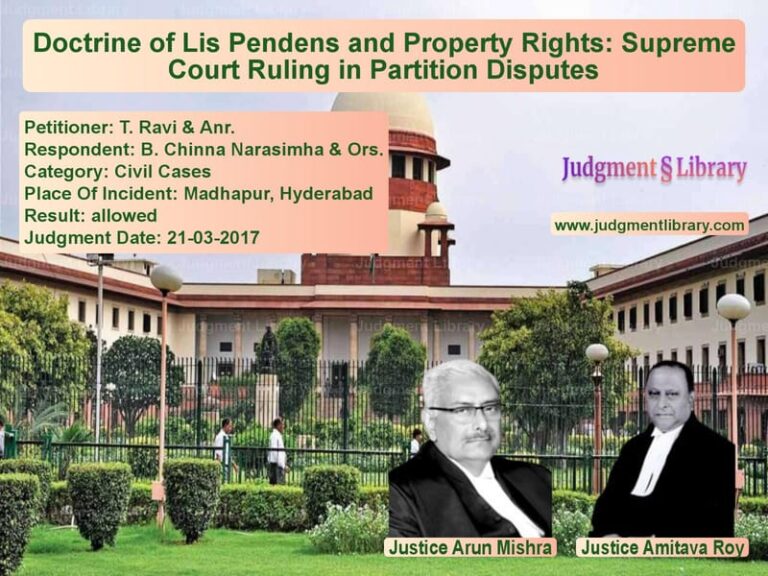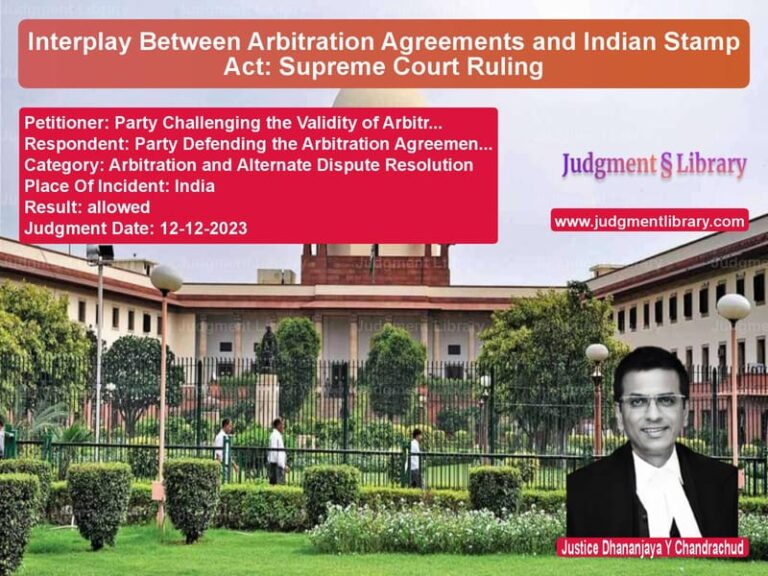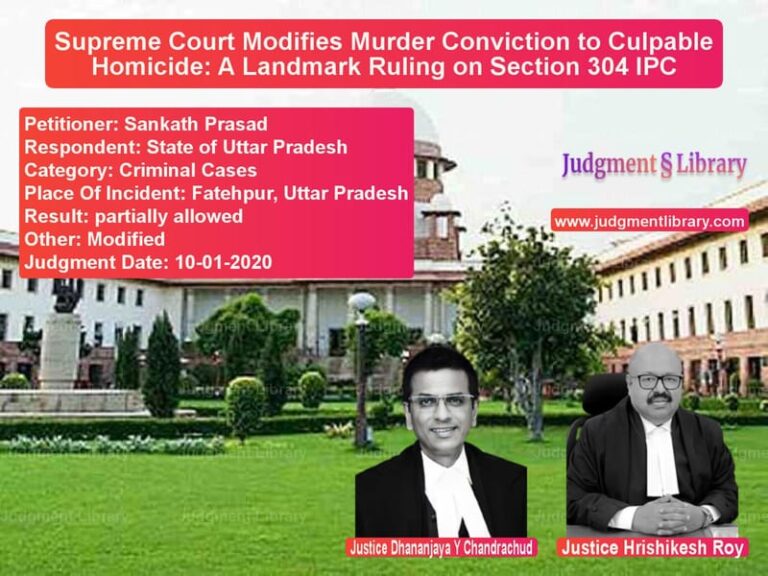Railway Employee Acquittal: Supreme Court Orders Full Back Wages After Wrongful Dismissal
The Supreme Court of India recently delivered an important judgment in the case of Raj Narain vs. Union of India & Ors., wherein it ruled in favor of a railway employee who had been wrongfully dismissed from service due to criminal charges. The appellant, Raj Narain, was dismissed from his post as a Sorting Assistant in the Railway Mail Service (RMS) at Mughalsarai due to alleged involvement in fraudulent financial transactions. However, he was later acquitted by the High Court, which nullified the charges against him. The Supreme Court, recognizing the wrongful nature of his dismissal, ruled that he was entitled to full back wages from the time of his suspension until his reinstatement.
This ruling reaffirms the fundamental principles of justice and employee rights, emphasizing that wrongful dismissal based on unproven allegations should not result in financial hardship for the employee. The Court held that an acquittal restores the employee’s status and rights as they were prior to dismissal.
Background of the Case
The dispute in this case arose from Raj Narain’s alleged involvement in a financial fraud concerning high-value money orders. Based on the allegations:
- October 23, 1979: The appellant was placed under suspension pending investigation.
- 1987: The suspension was revoked, and he was reinstated.
- February 28, 1997: The appellant was dismissed from service following his conviction under Sections 409, 420, and 467 of the IPC (Indian Penal Code).
- August 31, 2001: The Allahabad High Court acquitted him of all charges.
- June 13, 2002: Despite his acquittal, the railway authorities refused to reinstate him.
- 2003: The Central Administrative Tribunal (CAT) ruled in favor of reinstatement.
- April 1, 2019: The Supreme Court ruled in his favor, granting full back wages.
Arguments by the Appellant (Raj Narain)
Raj Narain presented the following arguments in his appeal:
- His dismissal was solely based on criminal charges that were later quashed by the High Court.
- The railway authorities had no independent grounds for his removal, as they had not conducted a separate departmental inquiry.
- Since his dismissal was unlawful, he was entitled to full back wages from the date of his suspension until the date of his reinstatement.
- The Tribunal’s decision to reinstate him should have also ensured that he received financial compensation for the wrongful dismissal.
Arguments by the Respondents (Union of India & Ors.)
The respondents defended their decision, arguing:
- The dismissal was justified based on his initial conviction.
- Acquittal in a criminal case does not automatically entitle an employee to reinstatement or full back wages.
- The railway authorities had acted in good faith based on the conviction at the time of dismissal.
- There was no departmental inquiry, so reinstatement was discretionary.
- The High Court had already awarded limited back wages from 2001 to 2003.
Supreme Court’s Observations and Ruling
The Supreme Court evaluated the case by focusing on two major issues:
1. Acquittal Restores Employment Rights
The Court observed that:
“Once an acquittal is secured, the previous dismissal becomes invalid, and the employee is entitled to the same status and benefits as before.”
This meant that Raj Narain should have been reinstated immediately after his acquittal.
2. Entitlement to Full Back Wages
The Court ruled:
“If an employee is dismissed solely based on criminal charges initiated at the behest of the employer, and he is acquitted, then he is entitled to claim full wages for the period he was kept out of duty.”
The Court noted that denying back wages would effectively punish the employee for a wrongful prosecution.
3. Failure of Railway Authorities to Conduct Departmental Inquiry
The judgment also pointed out that the railway authorities failed to conduct a departmental inquiry before dismissing the appellant. The Court stated:
“An employee cannot be penalized for charges that have been proven false. Denying reinstatement was arbitrary and against the principles of natural justice.”
Final Ruling
The Supreme Court ruled:
- The appellant is entitled to full back wages from October 23, 1979, to October 21, 1987.
- The government’s order denying reinstatement was set aside.
- The appellant was awarded wages from the date of acquittal (August 31, 2001) until reinstatement (January 20, 2003).
Implications of the Judgment
This ruling has significant implications for employment law and service matters:
- Protection Against Wrongful Dismissal: The ruling ensures that employees cannot be dismissed solely based on criminal charges without proper departmental inquiries.
- Financial Security for Wrongfully Dismissed Employees: The judgment establishes that if an acquittal nullifies criminal charges, the employee should not suffer financial consequences.
- Employer Accountability: Government authorities must ensure proper legal procedures before taking punitive action against employees.
- Reaffirmation of Employee Rights: The ruling reinforces that wrongful dismissal should not result in unjust financial losses.
The Supreme Court’s ruling in Raj Narain vs. Union of India & Ors. ensures that employees wrongfully dismissed due to criminal allegations receive justice and fair financial compensation. This case sets an essential precedent for service matters and highlights the importance of procedural fairness in employment law.
Petitioner Name: Raj Narain.Respondent Name: Union of India & Ors..Judgment By: Justice L. Nageswara Rao, Justice M.R. Shah.Place Of Incident: Mughalsarai, Uttar Pradesh.Judgment Date: 01-04-2019.
Don’t miss out on the full details! Download the complete judgment in PDF format below and gain valuable insights instantly!
Download Judgment: Raj Narain vs Union of India & Ors Supreme Court of India Judgment Dated 01-04-2019.pdf
Direct Downlaod Judgment: Direct downlaod this Judgment
See all petitions in Employment Disputes
See all petitions in Termination Cases
See all petitions in Pension and Gratuity
See all petitions in Judgment by L. Nageswara Rao
See all petitions in Judgment by Mukeshkumar Rasikbhai Shah
See all petitions in allowed
See all petitions in Modified
See all petitions in supreme court of India judgments April 2019
See all petitions in 2019 judgments
See all posts in Service Matters Category
See all allowed petitions in Service Matters Category
See all Dismissed petitions in Service Matters Category
See all partially allowed petitions in Service Matters Category


